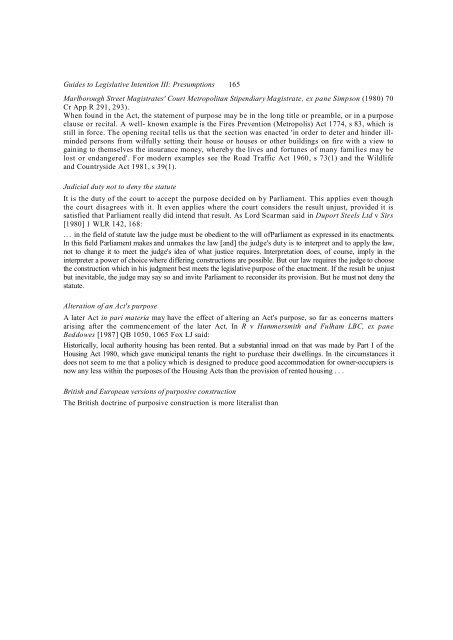Statutory Interpretation The Technique of Statutory ... - Francis Bennion
Statutory Interpretation The Technique of Statutory ... - Francis Bennion
Statutory Interpretation The Technique of Statutory ... - Francis Bennion
You also want an ePaper? Increase the reach of your titles
YUMPU automatically turns print PDFs into web optimized ePapers that Google loves.
Guides to Legislative Intention III: Presumptions 165<br />
Marlborough Street Magistrates' Court Metropolitan Stipendiary Magistrate, ex pane Simpson (1980) 70<br />
Cr App R 291, 293).<br />
When found in the Act, the statement <strong>of</strong> purpose may be in the long title or preamble, or in a purpose<br />
clause or recital. A well- known example is the Fires Prevention (Metropolis) Act 1774, s 83, which is<br />
still in force. <strong>The</strong> opening recital tells us that the section was enacted 'in order to deter and hinder illminded<br />
persons from wilfully setting their house or houses or other buildings on fire with a view to<br />
gaining to themselves the insurance money, whereby the lives and fortunes <strong>of</strong> many families may be<br />
lost or endangered'. For modern examples see the Road Traffic Act 1960, s 73(1) and the Wildlife<br />
and Countryside Act 1981, s 39(1).<br />
Judicial duty not to deny the statute<br />
It is the duty <strong>of</strong> the court to accept the purpose decided on by Parliament. This applies even though<br />
the court disagrees with it. It even applies where the court considers the result unjust, provided it is<br />
satisfied that Parliament really did intend that result. As Lord Scarman said in Duport Steels Ltd v Sirs<br />
[1980] 1 WLR 142, 168:<br />
... in the field <strong>of</strong> statute law the judge must be obedient to the will <strong>of</strong> Parliament as expressed in its enactments.<br />
In this field Parliament makes and unmakes the law [and] the judge's duty is to interpret and to apply the law,<br />
not to change it to meet the judge's idea <strong>of</strong> what justice requires. <strong>Interpretation</strong> does, <strong>of</strong> course, imply in the<br />
interpreter a power <strong>of</strong> choice where differing constructions are possible. But our law requires the judge to choose<br />
the construction which in his judgment best meets the legislative purpose <strong>of</strong> the enactment. If the result be unjust<br />
but inevitable, the judge may say so and invite Parliament to reconsider its provision. But he must not deny the<br />
statute.<br />
Alteration <strong>of</strong> an Act's purpose<br />
A later Act in pari materia may have the effect <strong>of</strong> altering an Act's purpose, so far as concerns matters<br />
arising after the commencement <strong>of</strong> the later Act. In R v Hammersmith and Fulham LBC, ex pane<br />
Beddowes [1987] QB 1050, 1065 Fox LJ said:<br />
Historically, local authority housing has been rented. But a substantial inroad on that was made by Part I <strong>of</strong> the<br />
Housing Act 1980, which gave municipal tenants the right to purchase their dwellings. In the circumstances it<br />
does not seem to me that a policy which is designed to produce good accommodation for owner-occupiers is<br />
now any less within the purposes <strong>of</strong> the Housing Acts than the provision <strong>of</strong> rented housing . . .<br />
British and European versions <strong>of</strong> purposive construction<br />
<strong>The</strong> British doctrine <strong>of</strong> purposive construction is more literalist than

















